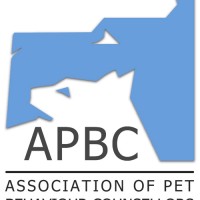 Currently there’s no regulation within the pet behaviour and dog training industry, so anyone can call themselves a dog trainer or pet behaviourist – and they do – without any appropriate experience or qualifications. I’m really proud of the qualifications and accreditations I’ve achieved. However, it’s difficult for the pet-owning public and co-professionals to know what to look for in a ‘pet behaviourist’. Membership of specific Associations rarely means anything, as there are Associations out there whose ethos are out-dated and potentially damaging to pets and owners. Dog owners only have to look online for assistance and they are flooded with conflicting information. How do they know who to approach for help? Look in the Yellow Pages and you’ll find Joe Bloggs, who simply completed a weekend course in behaviour and has owned dogs for 10 years yet still manages to have post-nominals after his name. All are confident that they have a good understanding of animal behaviour. But how do we sort valid information from conventional belief? Through systematic observations and experimentation, scientists look into how animal’s learn, how emotions affect behaviour, they observe and analyse body language and communication, study ethology and anthrozoology, human psychology, neuropsychology & psychopharmacology…. Science is constantly evolving – ideas and hypotheses are constantly challenged and revisited. It’s our best tool towards an objective understanding of complex systems.
Currently there’s no regulation within the pet behaviour and dog training industry, so anyone can call themselves a dog trainer or pet behaviourist – and they do – without any appropriate experience or qualifications. I’m really proud of the qualifications and accreditations I’ve achieved. However, it’s difficult for the pet-owning public and co-professionals to know what to look for in a ‘pet behaviourist’. Membership of specific Associations rarely means anything, as there are Associations out there whose ethos are out-dated and potentially damaging to pets and owners. Dog owners only have to look online for assistance and they are flooded with conflicting information. How do they know who to approach for help? Look in the Yellow Pages and you’ll find Joe Bloggs, who simply completed a weekend course in behaviour and has owned dogs for 10 years yet still manages to have post-nominals after his name. All are confident that they have a good understanding of animal behaviour. But how do we sort valid information from conventional belief? Through systematic observations and experimentation, scientists look into how animal’s learn, how emotions affect behaviour, they observe and analyse body language and communication, study ethology and anthrozoology, human psychology, neuropsychology & psychopharmacology…. Science is constantly evolving – ideas and hypotheses are constantly challenged and revisited. It’s our best tool towards an objective understanding of complex systems.
Of course, practical experience in training techniques is also vitally important, as is observation of peers and by peers, continual professional development, experience with a variety of different species and breeds and proficiency in treating a wide range of behavioural problems. I have been a member of the Association of Pet Dog Trainers (No. 1006) for several years. The APDT promotes training skills and techniques based on up-to-date, researched methods that apply the principles of kindness, fairness and effectiveness and are in keeping with modern learning theory. Membership is based on a practical assessment as well as theoretical knowledge. The Association of Pet Behaviour Counsellors represents an international network of behaviour counsellors that have achieved the “highest proven academic and practical standards available in the field of companion animal behavioural therapy”. The Animal Behaviour & Training Council is a new regulatory body that represents trainers and behaviour therapists to both the public and to legislative bodies. It sets and maintains the standards of knowledge and practical skills required and co-ordinates the much-needed regulation of the training and behaviour industry. Clinical Animal Behaviourists represent the highest level within the ABTC. In addition, the Pet Professional Guild represents pet industry professionals who are committed to force-free training.
Financing my qualifications, memberships, training, experience and continuing professional development has not been (and is still not) easy and at times is frustrating when the local dog whisperer appears to make up his version of Learning Theory on the spot. However, I’m pleased that I can rest easy at night safe in the knowledge that I have taken the long-winded route to become (and will continue to be) the best that I can and have the accreditations and qualifications to prove it.